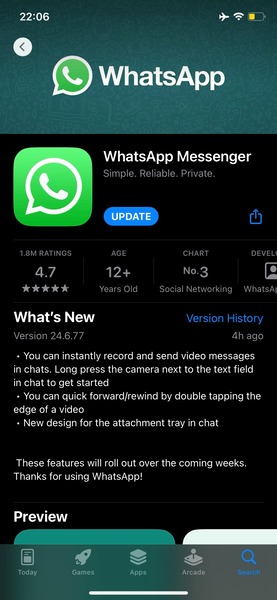What you need to know
- The latest update to WhatsApp for iOS brings a handy new feature to the messaging platform.
- Users, post the update, can double tap the screen to skip/rewind the video for ten seconds.
- The feature is very popular on YouTube and Twitter and the chances of getting into the Android version of WhatsApp are likely.
WhatsApp has a nifty new feature rolling out to iOS users this week that should make watching videos on the messaging platform a breeze.
Earlier this week, WhatsApp on iOS, with 24.6.77 version number, brought a handy new feature that allows users to fast-forward or rewind videos by double-tapping the edge of the screen (via WABetaInfo). The feature was quite popular in leading video apps like YouTube and social media apps like X (formerly Twitter).

While playing a video, double tapping on any edge of the video would fast forward or rewind the video by ten seconds.
For now, the feature is official for WhatsApp for iOS. The rollout of the feature to Android devices is still unclear; however, video control was previously introduced in the WhatsApp beta version for Android in November 2023. It was considered functional in the beta version, although the feature did not see the light of day in the stable version of the app.
Since iOS users are getting this functionality now, we could soon see it on Android phones and tablets as well. It would be a nice feature to see among several others that have popped up over the past few weeks.

Some of WhatsApp’s newest features include longer Instagram-like status updates, which are also in the latest beta version of the app for Android devices. Another feature seen in the works is the ability to hide previews of links shared in messages on WhatsApp.
WhatsApp on Android is also testing the ability to transcribe voice notes within chats, which is very useful in certain scenarios when users can’t hear voice messages and want to read them instead. An interesting aspect of the feature is that they are still end-to-end encrypted and do not leave the device. The feature is already active on the iOS platform.